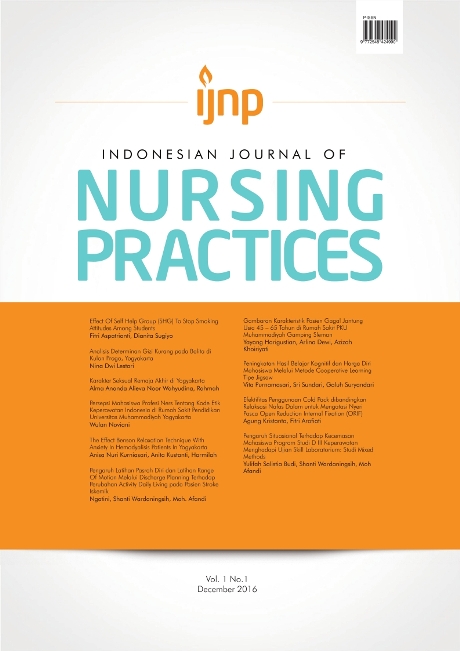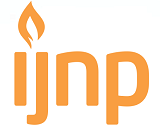PENGARUH SITUASIONALTERHADAP KECEMASAN MAHASISWA PROGRAM STUDI D III KEPERAWATAN MENGHADAPI UJIAN SKILL LABORATORIUM: STUDI MIXED METHODS
DOI:
https://doi.org/10.18196/ijnp.v1i1.3422Keywords:
anxiety, lab skills, nursing studentsAbstract
Purpose: The purpose of this study wasto determine the influence of situational to anxiety and anxiety levels of diploma nursing students at Institute of Health Sciences Banyuwangi in the skill exam laboratory. Method: This study used a mixed methods with explanatory sequential models, by involved were students, lectures and the lab staff in January, 16th-20 th 2017. The quantitative analysis used Kruskall Wallis test, followed by a qualitative analysis of manually categorizing data then inferred from both the analysis. Result: The result of quantitative method that the majority of respondents were in mild anxiety levels, by Kruskall Wallis obtained a not significant influence on situational to anxiety of Diploma Nursing Student in the exam skills lab. Qualitative results indicated to four themes: noisy, temperature skill room, timing in the exam skill lab and preparation of the situational. Conclusion: that the majority of respondents were in mild anxiety levels and there’s the influence of situational to anxiety in diploma nursing students. By that results, to have follow-up for students, examiner, and the lab staffs from relevant parties concerned to overcome the student’s anxiety toward the lab skills exam related in atmosphere skill lab exam.
References
Ahyar. (2010). Konsep Diri dan Mekanisme Koping dalam Aplikasi Keperawatan. (diakses 9 Agustus 2015). Tersedia dari: www.e-psikologi.com
Arief, S., & Sumarni. (2013). Hubungan kecemasan menghadapi ujian skills lab modul shock dengan prestasi yang dicapai pada mahasiswa FK Universitas Gajah Mada angkatan 2000. diakses 5 Mei 2013 dari http://www.ebookspdf.org/download/kecemasan.html
Basuki, I., & Hariyanto. (2015). Asesmen Pembelajaran. Remaja Rosdakarya Offset. Bandung.
Dikti. (2016). Uji Kompetensi Nasional Progam Pendidikan D3 Keperawatan untuk ProfesionalitasTenaga Perawat. Diakses 19 April 2016 dari http://belmawa.ristekdikti.go.id
Esswi,A., Badawy, A.S., & Shaliabe,H. (2013). OSCE in maternity and community health nursing: Saudi nursing student’s perspective. American Journal of Research Communication, Vol.1, No.3, 143-162
Kaplan, HI, Saddock, BJ & Grabb, JA. (2010). Kaplan-Sadock Sinopsis Psikiatri Ilmu Pengetahuan Prilaku Psikiatri Klinis. Bina Rupa Aksara. Tangerang.
Kemenkes RI. (2010). Standart Laboratorium Keperawatan Pendidikan Tenaga Kesehatan. Jakarta: Badan PPSDM Kesehatan
Lallo, D.A., Kandou, L. F. J., & Munayang, H. (2013). Hubungan kecemasan dan hasil ujian UAS-1 mahasiswa baru fakultas kedokteran universitas Sam Ratulangi Manado tahun ajaran 2012/2013. E-Journal Universitas Sam Ratulangi. Vol 1, no 2.
Papastavrou, E., Lambrinou, E., Tsangari, H., Saarikoski, M. & Leino-Kilpi, H. (2010). Student nurses experience of learning in the clinical environment. Nurse Education in Practice, vol. 10, no. 3, pp. 176-82
Ping, L.T., Subramaniam, K., & Krishnaswamy, S. (2008). Original article test anxiety : state , trait and relationship with exam. , 15(2).
Potter, P.A & Perry, A.G. (2010). Buku Ajar Fundamental Keperawatan: Konsep, Proses, Dan Praktik.Edisi 4.Volume 1.Alih Bahasa: Yasmin Asih, dkk. Jakarta, EGC
Pratiwi, C., & Mufdlillah. (2009). Faktor-Faktor yang Mempengaruhi Hasil Uji Kompetensi Dengan Metode OSCA Lulusan DIII Kebidanan Di Propinsi DIY.
Ramaiah. (2007). Kecemasan: Bagaimana Mengatasi Penyebabnya. Pustaka Obor. Jakarta.
Rasmun. (2009). Stress Koping dan Adaptasi. CV. Sagung Seto. Jakarta
Suliswati. (2014). Konsep Dasar Keperawatan Kesehatan Jiwa. EGC. Jakarta.
Tim Bahan Penyusunan Kurikulum AIPDiKi. (2014). Bahan Pengembangan Kurikulum Prodi D III Keperawatan. Asosiasi Institusi Pendidikan Diploma III Keperawatan Regional 6 Jawa Timur. Surabaya.
Yang, R., Lu, Y., Chung, M. & Chang, S. (2014). Developing a short version of the test anxiety scale for baccalaureate nursing skills test - A preliminary study. Nurse Education in Practice, vol. 14, no. 6, pp. 586-590.
Downloads
Published
Issue
Section
License
License
Articles published in the IJNP (Indonesian Journal of Nursing Practices) are licensed under a Attribution 4.0 International (CC BY 4.0) license. You are free to:
- Share — copy and redistribute the material in any medium or format.
- Adapt — remix, transform, and build upon the material for any purpose, even commercially.
This license is acceptable for Free Cultural Works. The licensor cannot revoke these freedoms as long as you follow the license terms. Under the following terms:
Attribution — You must give appropriate credit, provide a link to the license, and indicate if changes were made. You may do so in any reasonable manner, but not in any way that suggests the licensor endorses you or your use.
- No additional restrictions — You may not apply legal terms or technological measures that legally restrict others from doing anything the license permits.
Copyright
Authors who publish with IJNP (Indonesian Journal of Nursing Practices) agree to the following terms:
- Authors retain copyright and grant IJNP (Indonesian Journal of Nursing Practices) the right of first publication with the work simultaneously licensed under an Attribution 4.0 International (CC BY 4.0) that allows others to remix, adapt and build upon the work with an acknowledgment of the work's authorship and of the initial publication in IJNP (Indonesian Journal of Nursing Practices).
- Authors are permitted to copy and redistribute the journal's published version of the work (e.g., post it to an institutional repository or publish it in a book), with an acknowledgment of its initial publication in IJNP (Indonesian Journal of Nursing Practices).















